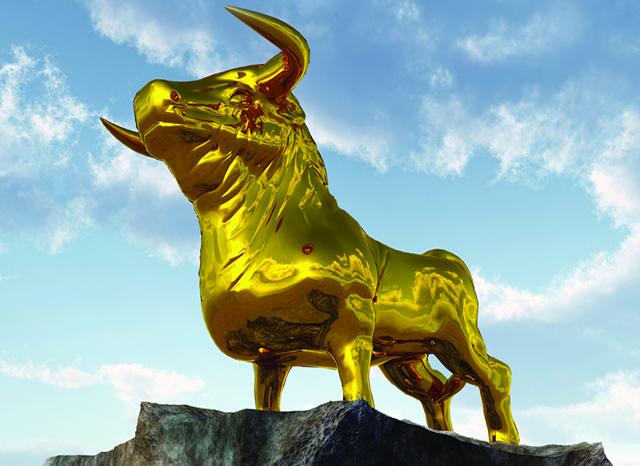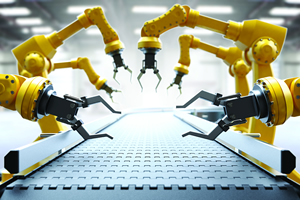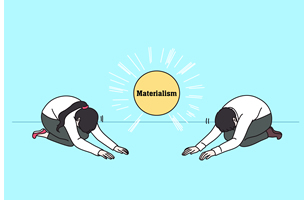
End Time Trinity - Material, Manufacturing, Merchandise
It is highly significant that after all the horrible events taking place on earth, the people do not mourn over the death and destruction; rather, their sole concern is that they can no longer sell their merchandise. That is the result of the battle of Armageddon. The end has finally come.
Five times we read the words “I will.” These statements are ascribed to Lucifer. The Hebrew-English translation reads, “O shining one, son of dawn.” Luther says, “Thou beautiful morning star.” The NIV, “O morning star, son of the dawn!” (Isaiah 14:12). It is quite clear he was the leader who rebelled against God. Revelation 12:9 states: “And the great dragon was cast out, that old serpent, called the Devil, and Satan.” This fourfold name identifies the same created being, “O Lucifer, son of the morning.”
His fivefold desire is:
1. “I will ascend into heaven”; 2. “I will exalt my throne above the stars of God”; 3. “I will sit also upon the mount of the congregation, in the sides of the north”; 4. “I will ascend above the heights of the clouds”; 5. “I will be like the most High.”
The late Dr. Ed Vallowe calls attention to the number five by dividing John 3:16:
1.“For God so loved the world,” 2. “that he gave his only begotten Son,” 3. “that whosoever believeth in him,” 4. “should not perish, but,” 5. “have everlasting life.”
Vallowe further comments: “There were five offerings upon the altar of sacrifice:
1.The burnt offering, 2. The peace offering, 3. The sin offering, 4. The trespass offering, 5. The meat offering.”
What is Satan’s plan? To replace God; to produce a counterfeit, thus Antichrist. He has already deceived the world except for the Church. The battle between lies and truth, darkness and light, continues until this day.
Jesus made this prophecy while addressing the Jews: “I am come in my Father’s name, and ye receive me not: if another shall come in his own name, him ye will receive” (John 5:43). That simply means an imposter will come, and Israel will believe him.
Abraham’s Faith
The key word found throughout Scripture is “faith.” Adam and Eve believed the lie of Satan more than they believed the Word of God; thus, humanity became polluted and was cast out of Paradise, with certain curses declared upon Adam, Eve, and the serpent.
What did God do? He chose one man, Abraham, who received specific promises:
1. His descendants would inherit the land of Canaan from the River of Egypt to the River of Euphrates.
2. The Bible says, “he [Abraham] believed in the Lord; and he [God] counted it to him for righteousness” (Genesis 15:6). He was the first one saved by faith.
3. Unlimited global blessing: “And in thy seed shall all the nations of the earth be blessed; because thou hast obeyed my voice” (Genesis 22:18).
Seeing Is NOT Believing
Bible readers know the story of Israel. They experienced supernatural revelations. God interfered on behalf of Israel by parting the Reed (Red) Sea. They were protected by the pillar of fire at night and cloud by day. Later, they crossed the Jordan River as if on dry ground. But all these visible manifestations of God did not save Israel, did not produce faith.
Real Faith
What is faith? “Now faith is the substance of things hoped for, the evidence of things not seen” (Hebrews 11:1). Romans 1:20 further testifies: “For the invisible things of him from the creation of the world are clearly seen, being understood by the things that are made, even his eternal power and Godhead; so that they are without excuse.” Creation itself reveals the invisible God; it is all but impossible to deny God when one studies biology, anthropology, astronomy, or geology. There is a clear pattern revealing the invisible Creator.
Moses was a man of faith. The distinction between the people and him and is declared in Psalm 103:7: “He made known his ways unto Moses, his acts unto the children of Israel.” In Psalm 106:7, we read of Israel’s lack of faith: “Our fathers understood not thy wonders in Egypt; they remembered not the multitude of thy mercies; but provoked him at the sea, even at the Red sea.”
Idolatry
To summarize the entire Old Testament, particularly relating to Israel, we could use one word: idolatry.
Isaiah 40:18-20 declares: “To whom then will ye liken God? or what likeness will ye compare unto him? The workman melteth a graven image, and the goldsmith spreadeth it over with gold, and casteth silver chains. He that is so impoverished that he hath no oblation chooseth a tree that will not rot; he seeketh unto him a cunning workman to prepare a graven image, that shall not be moved.”
Materialism
Usually, we associate idols with objects made by man, considered to be divine in various religions. That, of course, is true, but it’s an easy way out. The New Testament reads: “And the rest of the men which were not killed by these plagues yet repented not of the works of their hands, that they should not worship devils, and idols of gold, and silver, and brass, and stone, and of wood: which neither can see, nor hear, nor walk” (Revelation 9:20).
Notice “idols” are made from gold, silver, bronze, stone, and wood. Those are created materials. Thus, materialism is the key to end time idol worship. Whatever is manufactured today—while it may be fascinating and amazing, such as a mobile phone, for example—is manufactured from materials created by God.
Technology’s Progress
Quite often, when in fellowship with friends and family, one quickly observes that particularly the younger generation is not fully participating in the gathering, but rather immersed in a mobile phone, tablet, laptop, etc.
Take, for example, the weather. That was one of the first questions one would ask when making a long-distance call. Today, it’s totally unnecessary; at any time, with just one tap on our mobile phones, we can see the current weather and forecast for any place in the world.
During Biblical times, Jesus made this statement: “When it is evening, ye say, It will be fair weather: for the sky is red” (Matthew 16:2). That was the general way to forecast weather during the time of this writer. Today, it’s the manufactured electronic devices that enable one to see the weather patterns—not just locally, but globally.
This confirms our increasing dependence on manufactured merchandise.
But there is more: today, there is much talk about artificial intelligence (AI). What can it do? What will it do? In simple terms, make predictions—not only about the weather, but also concerning traffic patterns, investment opportunities, etc., while providing innumerable other helpful suggestions, instructions, and statements about virtually any subject—all in an instant. But one thing is missing: namely, the most important—acknowledging the Creator.
Modern Idols
In simple terms, an idol is anything you desire to have but you don’t need. This became very evident some years ago, when I visited one of my sons in a settlement (subdivision in the US) on our walk one Saturday evening. Taking careful notice of garages that were open, we observed that 7 out of 10 were filled with merchandise, providing no room for the intended purpose: parking one’s car.
Driving around town, one notices a new type of business: self-storage. Here is what storable.com writes:
At each of these self-storage facilities, people pay rent—usually by the month—to store their stuff in units of various sizes. They could be stashing furniture, art, appliances, TVs, documents, holiday decorations, wine, vehicles, boats or RVs.
 Why do people pay rent to hold stuff that they don’t need in storage? Although there are exceptions, in most cases it’s simply idolizing the merchandise they acquired.
Why do people pay rent to hold stuff that they don’t need in storage? Although there are exceptions, in most cases it’s simply idolizing the merchandise they acquired.
The article then adds: “By one estimate, the typical profit margin of a self-storage business in the U.S. is 11%. … the typical profit margin of a restaurant ranges from 3% to 5%.” Apparently, these facilities are quite profitable for the business owner. The person who becomes a customer of the self-storage facility, had no space in their home or garage to store the merchandise they bought but don’t need. Most are not willing to part with it, because it has become an idol—a product that cannot speak, hear, walk, advise you, or give you help in times of need. Welcome to modern idolatry.
Celebrities
We could also analyze celebrities, whether in entertainment or sports, who have become idols to vast numbers of the world’s population.
Take actors, for example. What is he or she? A person who mimics being somebody else. They have to act in such a fashion that the actor almost becomes the character they are portraying. But in reality, it’s fake; presenting a lie. Ancient Roman writings reveal that actors were categorized on the same level as prostitutes. Webster’s New World College Dictionary states: “a person, as a writer, artist, etc. who sells his or her service”—clearly indicating the substitute for something real.
Checking the internet, there are dozens of firms that specialize in collecting and selling everything from headwear to socks: clothing worn by stars (idols) to be resold at an exorbitant price. A pair of socks from a top US idol would fetch over $100,000.
Whenever faith in the living Creator has been displaced by merchandise, idolatry is the natural result.
What is an idol? Something I don’t need—in reality, useless. So, the question: why do we buy things we don’t need? Because we pay heed to the merchandizers’ promotions and marketing, convincing us that we actually must have their merchandise. We believe it; we buy it; we store it. But we really don’t need it.
Wrong Faith
Our original parents, Adam and Eve, believed the words of the serpent more than they believed the Word of God. Later, the dispensation of the Law came to Moses. But, we can say with assurance, the chosen nation Israel failed. Why? No faith. What was the result? “For what the law could not do, in that it was weak through the flesh, God sending his own Son in the likeness of sinful flesh, and for sin, condemned sin in the flesh” (Romans 8:3).
Church Age
From Acts 2, we learn of the birth of the Church in Jerusalem: “Then they that gladly received his word were baptized: and the same day there were added unto them about three thousand souls” (Acts 2:41). They believed; they received the Word. From that point on, the Church went through various stages of prosperity and persecution. This is documented for us in the first three chapters of the book of Revelation. Yet, the Church continues to grow to this day.
The Old Hymns
In the history of the Church, there are hundreds of thousands of ancient hymns, which all had one thing in common; namely, trust in the accomplished work of Christ—worshiping Him and Him alone. When reading some of the old hymns dating back to the 14th century, we notice the authors’ reliance on God: deeply humbling oneself, depending on God’s mercy and grace.
Reliance on God was emphasized in the agricultural industry, since over 95% of the population would be working from dawn to dusk for food, clothing, and shelter.
Back in 1529, Martin Luther prayed: “A mighty fortress is our God, a bulwark never failing; our helper he, amid the flood of mortal ills prevailing.” That was essential; protection from danger was placed in the hands of God.
Depending on God
Prayers and supplication to God clearly revealed their dependence upon Him. Without rain or sunshine, there would be no crop; people would starve. To work 6 days a week, 12 to 18 hours a day, just to make ends meet, was not something unusual but the order of the day. We may summarize the condition of the people before the Industrial Revolution with the prayer of the publican (tax collector), “God be merciful to me a sinner” (Luke 18:13b).
This writer still remembers his father opening the old, yellowed prayer book, wherein was repeated the supplication, “Save us from war, from flood, fire, drought, pestilence and starvation.” Incidentally, war was a nearly continuous condition throughout the European continent; that is well-documented in history.
 Industrial Revolution
Industrial Revolution
With the advances of the Industrial Revolution, the development of food production increased with almost unbelievable speed. In olden days, over 95% of the working population was involved in producing food. But today, mechanized agriculture employs less than 2% of the workforce in the industrialized world, producing an over-abundance of food.
While farmers 200-300 years ago prayed that the crop would grow and the animals would increase, the target of prayer has moved from God to the equipment—may it last longer, may it not break down.
Here we must recall that everything—even the most primitive plow, pitchfork, or steam engine—was built from created materials: iron, coal, oil, copper, silver, gold, etc.
Someone recently said the following: “The devil, with a clump of clay in his hands, approached God and said, ‘I too can create man out of this,’ to which God answered, ‘Get your own clay.’”
Dependence on Material
While the Industrial Revolution was limited to Europe in its early stages, it later spread to the European colonies around the world. Machines, built from created material, became so sophisticated that the average farmer could no longer repair broken equipment, much less properly operate it without a trained technician instructing the farmer. Welcome to computer-guided technology!
Not many people in the industrialized world pray to God for sunshine and rain to make the crops grow, and ask God to increase their flocks and herds. That’s old-fashioned. Modern agriculture produces an over-abundance of high-quality food, so that almost 46% is wasted.
Hungry? Just drive to the nearest supermarket. You will find the shelves loaded with a variety of products our parents and grandparents would have been startled to see. Not to mention the fact that we do not have to go to the horse stable and attach the carriage to drive to the grocery store. We sit in an air-conditioned, comfortable vehicle, with all the amenities that kings and queens could not have even dreamed of a few centuries ago.
Where does this lead us? Very simply, away from God and toward dependence on technology, manufactured from created materials.
Manufacturers
Manufacturers have developed assembly lines, producing merchandise 24 hours a day, 7 days a week. Each year, products are of higher quality than the previous year.
Actually, assembly lines are more and more being dominated by robots. They are working faster, more precisely, and in a more reliable manner; not getting tired, not getting sick, and producing high-quality products in great abundance the world over.
It’s no longer just food, clothing, and shelter; that’s a given. Today, the world’s nations are in competition with each other to manufacture high-quality products at low cost. We must add, many of the products we purchase are not essential: we just want it! Overfilled dumping grounds testify to that fact.
Merchandizers
Studies show that merchandise has become a major contributor in avoiding military conflict. It is all but impossible to imagine France attacking Germany or England the USA.
It is noteworthy that today, armed conflict is mostly found between countries not fully industrialized. The whole world has become a giant, interconnected factory, with nations running assembly lines virtually nonstop to produce merchandise; often, making things that are non-essential—in fact, idols.
Today, merchandizers are the largest employers in the world; for example, Walmart has 2.2 million employees; China Railway, 2 million; McDonald’s, 1.9 million; China National Petroleum Corporation, 1.6 million; Amazon, 1.5 million. These companies are not producing merchandise, they are the merchandizers—they buy and they sell.
For instance, the UK has a population of 60 million and a workforce of 30 million; only 1% is employed in agriculture, with 25% in industry, and 74% in services.
With the explosion of high-tech industry, dependence on God has substantially decreased. Merchandise has become the god of the end times!
Revelation
With this statement, we come to the very end of civilization as recorded in the book of Revelation. This book is relatively small—only 11,950 words, and it can be read in about 3 hours.
Revelation 18:3 states: “For all nations have drunk of the wine of the wrath of her fornication, and the kings of the earth have committed fornication with her, and the merchants of the earth are waxed rich through the abundance of her delicacies.”
Interestingly, the merchants are not of a certain country, but “of the earth”—that is global.
It is highly significant that after all the horrible events taking place on earth, the people do not mourn over the death and destruction; rather, as verse 11 testifies: “And the merchants of the earth shall weep and mourn over her; for no man buyeth their merchandise any more.” Their sole concern is that they can no longer sell their merchandise. That is the result of the battle of Armageddon. It is the total disintegration of the global economy; the end has finally come.
Hiding Behind Created Material
One more item to conclude the message: “And the kings of the earth, and the great men, and the rich men, and the chief captains, and the mighty men, and every bondman, and every free man, hid themselves in the dens and in the rocks of the mountains; And said to the mountains and rocks, Fall on us, and hide us from the face of him that sitteth on the throne, and from the wrath of the Lamb” (Revelation 6:15-16).
 The people of the world are not repenting or asking for forgiveness, but praying to “the rocks of the mountains.” That’s the very place from which they have taken the material to manufacture their merchandise. Now they pray to God-created material for help; they worship materialism.
The people of the world are not repenting or asking for forgiveness, but praying to “the rocks of the mountains.” That’s the very place from which they have taken the material to manufacture their merchandise. Now they pray to God-created material for help; they worship materialism.
It is of interest how the founders of communism viewed material:
For Marx and Engels, materialism meant that the material world, perceptible to the senses, has objective reality independent of mind or spirit. They did not deny the reality of mental or spiritual processes but affirmed that ideas could arise, therefore, only as products and reflections of material conditions.
-www.britannica.com
Finally, they see the created material from which they manufactured merchandise, being exposed by the wrath of the Lamb. But too late. Praying to the material, “the mountains and rocks,” is in vain, and that for all eternity.
Midnight Call - 05/2022

